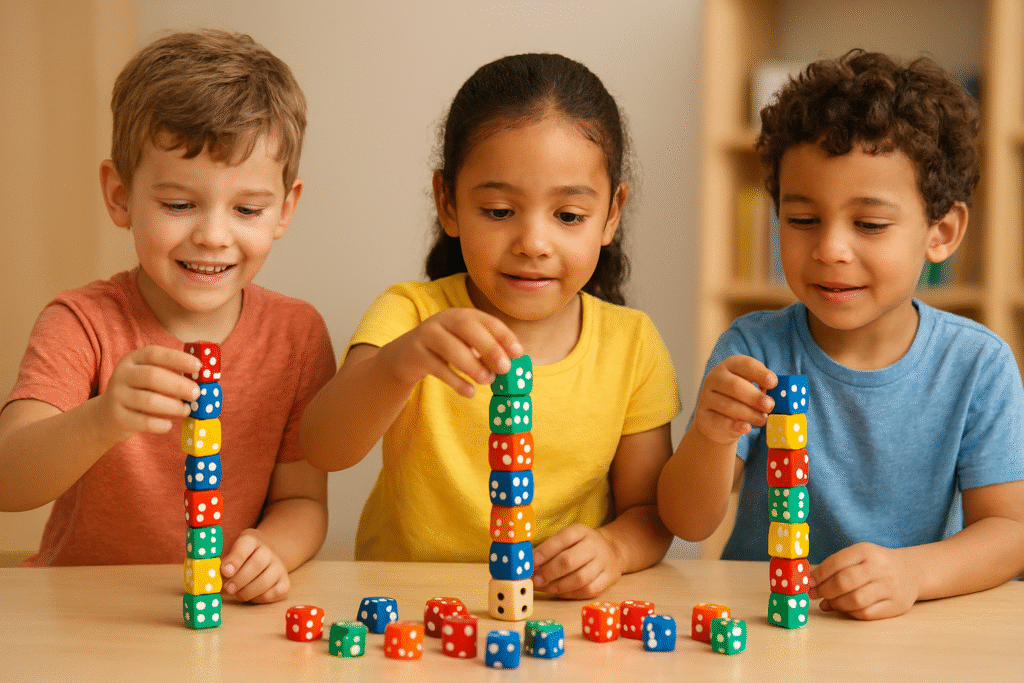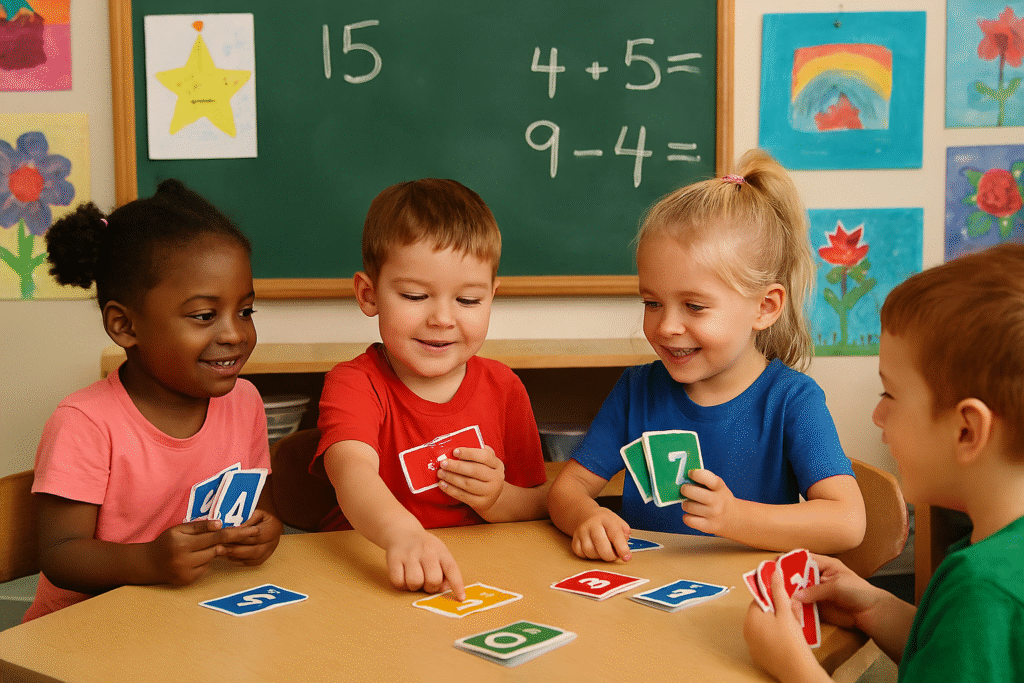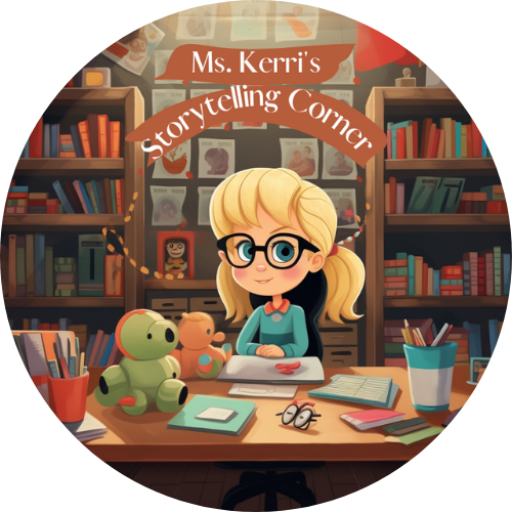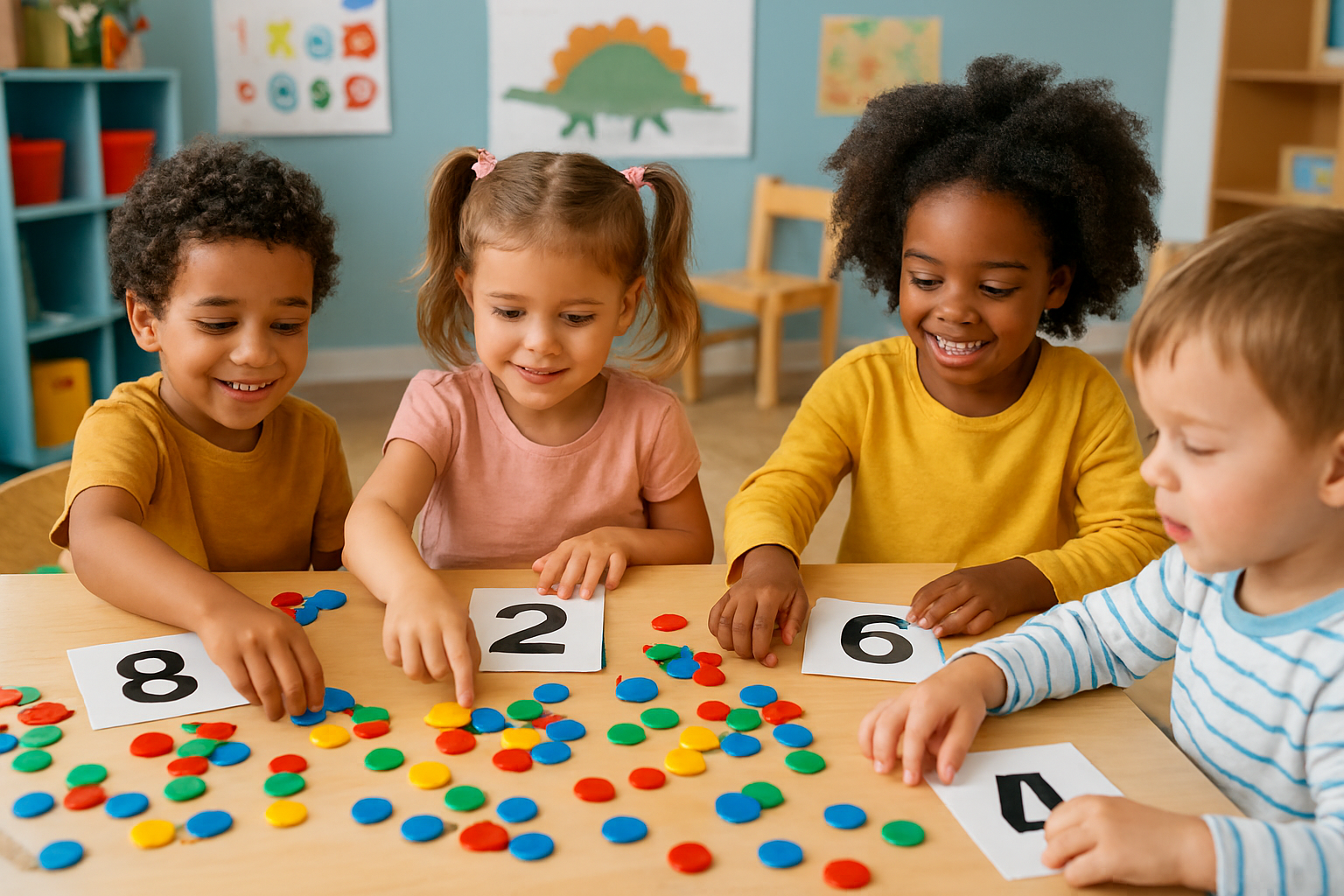Let me tell you something that might surprise you: I’ve never met a preschooler who said they hate math. You know why? Because when we do it right, they don’t even realize they’re doing math. They just think they’re playing games, having fun, and trying to beat their friend at a card game.
That’s the secret sauce to teaching math in preschool—disguising it as play. And honestly, it’s not even disguising. Play IS how young children learn math best. It’s how their brains are wired to make sense of numbers, patterns, and relationships.
After years of watching little ones light up over “just one more game,” I’ve learned that the most effective math games for preschoolers are the ones that feel like zero work and one hundred percent fun. Let me show you how to make that happen in your classroom or home.
Why Games Are the Best Tool for Teaching Math in Preschool
Here’s what happens when you try to teach a four-year-old math through worksheets: their eyes glaze over, they start wiggling, and suddenly they need to use the bathroom for the third time in ten minutes.
But hand them dice and challenge them to a race? They’re suddenly counting dots, comparing numbers, and doing addition without even knowing it. That’s because games give math context and purpose. They’re not learning “3 + 2” in the abstract—they’re figuring out if they beat you, and that motivation is powerful.

Math games for preschoolers also:
- Build number sense naturally through repeated exposure
- Teach kids to lose gracefully (seriously underrated life skill)
- Allow for differentiation without anyone feeling singled out
- Make practice feel fresh every single time
- Sneak in skills like taking turns, following rules, and strategic thinking
Plus, let’s be honest—they’re way more fun for us adults too. I’d rather play a quick game than correct worksheets any day.
The Core Math Skills Preschoolers Need
Before we jump into specific games, let’s talk about what we’re actually teaching. Teaching math in preschool isn’t about memorizing facts. It’s about building these foundational skills:
Counting and Number Recognition: Knowing number names, counting objects accurately, recognizing written numerals.
One-to-One Correspondence: Understanding that each object gets counted once and only once.
Number Comparison: Figuring out which group has more, less, or the same amount.
Basic Addition and Subtraction: Combining groups or taking away (concretely, not abstractly).
Patterns and Sorting: Recognizing what comes next and organizing by attributes.
Shapes and Spatial Reasoning: Identifying shapes and understanding how they fit together.
Measurement: Comparing length, weight, and capacity.
The beautiful thing about math games for preschoolers is that one game often hits multiple skills at once. That’s efficient teaching!
Easy Math Games You Can Start Tomorrow
Dice Games (The MVP of Preschool Math)
Dice are magic. Seriously. For about two dollars, you can teach almost every early math concept.
Race to 10: Each player rolls a die and moves that many spaces on a simple track. First to 10 wins. This teaches counting, number recognition, and one-to-one correspondence as they move their piece.
Dice Towers: Roll two dice, count the dots, stack that many blocks. Who can build the tallest tower? Hello, addition and fine motor skills.
More or Less: Each player rolls a die. Who rolled more? This simple comparison builds number sense faster than you’d believe.
For more dice game variations, check out The Measured Mom for tons of free resources.

Card Games (Not Just for Grown-Ups)
A regular deck of cards is a goldmine for teaching math in preschool. Remove the face cards and you’ve got numbers 1-10.
Compare (War): Each player flips a card. Highest number wins both cards. You’re teaching number comparison without worksheets.
Number Match: Spread cards face down. Find matching pairs. Memory game meets number recognition.
Make 5 (or 10): Lay out cards. Find two that add up to your target number. This makes addition concrete and visual.
Board Games (Yes, Really)
You don’t need fancy educational games. Classic board games are perfect math games for preschoolers.
Chutes and Ladders: Counting spaces, number recognition on the spinner, and patience when you slide down.
Candy Land: Color recognition, following directions, and understanding sequence.
Hi Ho Cherry-O: Counting, addition, subtraction, and early number operations.
The repetition in these games builds skills through natural practice. Plus, they’re teaching game etiquette and social skills as a bonus.
Movement Math Games
Preschoolers need to MOVE. Why not move with math?
Number Jump: Call out a number. Kids jump that many times. Want to make it harder? “Jump 3 times, now 2 more. How many total?”
Shape Hunt: “Find something circle-shaped!” Gets them up, observing their environment, and thinking about geometry.
Beanbag Toss: Toss beanbags into numbered buckets. Add up the points. This combines gross motor skills with addition.
Musical Math: Like musical chairs, but when the music stops, kids grab a number card and have to hop, clap, or spin that many times.
For creative movement activities that incorporate learning, visit Kindergarten Chaos for inspiration.
DIY Math Games with Materials You Already Have
Number Parking Lot
Write numbers on toy cars and numbers on parking spaces (use masking tape on the floor or draw on a cardboard box). Kids match the car to its parking spot. This teaches number recognition through play they already love.
Counting Collections
Put small collections of items in bags (buttons, shells, pasta). Kids dump them out, count them, and record the number. Change the collections weekly. This is teaching math in preschool at its finest—hands-on, concrete, and interesting.
Playdough Math
Roll playdough into balls. How many balls can you make? Make snakes. Which is longer? Flatten circles. Can you make one bigger than mine? You’re teaching measurement, counting, and comparison through sensory play.

Pattern Block Challenges
Create a simple pattern with pattern blocks. Can kids copy it? Extend it? Create their own? Patterns are the foundation of algebraic thinking, and these are perfect math games for preschoolers who love puzzles.
Games That Teach Specific Skills
For One-to-One Correspondence
Feed the Monster: Draw a monster face on a box with a big mouth. Kids “feed” it the correct number of pom-poms or counting bears based on a number card you show.
Egg Carton Count: Write numbers in egg carton cups. Kids add that many small objects to each cup.
For Number Comparison
More or Less Fishing: Make paper fish with numbers on them. Add paper clips. Kids use magnet fishing poles to catch two fish and tell you which has more.
Number Line Jump: Tape numbers on the floor. Call out “more than 5” or “less than 3” and kids jump to any number that fits.
For Basic Operations
Bowl and Count: Set up bowling pins (or plastic bottles). Knock them down. How many fell? How many are still standing? That’s subtraction in action.
Snack Math: “You have 3 crackers. I’m giving you 2 more. How many now?” Then let them eat the answer. Delicious math.
For more ideas on incorporating math into everyday routines, PBS Parents has excellent free resources.
Making Math Games Work in Your Classroom
Start Small
Don’t try to introduce five new math games for preschoolers in one week. Start with one or two that feel manageable. Master those, then add more. Kids actually benefit from repetition—the same game played multiple times builds deeper understanding than constantly new activities.
Model First, Play Second
Always play a practice round where you demonstrate. “Watch how I roll the die, count the dots, then move my piece.” Preschoolers need to see the process before doing it themselves.
Differentiate Naturally
The beauty of teaching math in preschool through games is that you can easily adjust difficulty. Playing with a child who’s struggling with counting to 5? Use a die with dots instead of numerals. Playing with a child who’s ready for more? Add two dice together.
Nobody feels singled out because you’re just “changing the rules” or “making it harder.”
Create a Math Games Rotation
Set up a shelf or basket with 4-5 games that stay out for a week or two. Kids can choose which one to play during free choice time. Rotate in new games gradually. This gives them ownership while ensuring repeated practice.
Play With Them
This might be obvious, but teaching math in preschool works best when you’re in there playing too. Ask questions: “How did you know that was more?” “What do you think will happen if…?” “How many more do you need to win?”
Your engagement makes the math visible and valued.
Common Pitfalls to Avoid
Turning games into tests. If a child says “5 + 2 is 8,” don’t make a big deal about the mistake during the game. Note it for later and keep playing. Games should feel safe.
Over-complicating rules. Preschoolers need simple, clear rules. If you’re explaining for more than 30 seconds, simplify.
Forcing it. If a child isn’t interested in a particular game, that’s okay. There are dozens of other math games for preschoolers to try. Follow their interests.
Forgetting the fun. If it stops being fun, it stops being effective. Keep it light and playful.

Connecting Games to Real Math Learning
You might wonder if these games actually translate to “real” math skills. The answer is absolutely yes. Research consistently shows that children who develop strong number sense through play perform better in formal math later.
The games create neural pathways for mathematical thinking. They build confidence. They make math feel approachable rather than intimidating.
When children eventually sit down with paper and pencil, they’re not starting from scratch. They’re connecting abstract symbols to concrete experiences they’ve had with dice, cards, blocks, and movement.
For evidence-based information on early childhood math development, NAEYC offers valuable research and resources.
Your Math Game Starter Kit
Want to jump into teaching math in preschool through games tomorrow? Here’s what to grab:
- A pair of dice (or three)
- A deck of cards
- A simple board game
- Counting manipulatives (buttons, bears, anything small)
- Paper and markers to make DIY games
- Enthusiasm and a willingness to lose sometimes
That’s it. You don’t need expensive kits or elaborate setups. You need time, intention, and a playful spirit.
The Bottom Line
Teaching math in preschool doesn’t require fancy curricula or pressure-filled lessons. It requires games, play, and joy. When you use math games for preschoolers as your primary teaching tool, you’re not taking shortcuts—you’re following decades of research on how young children learn best.
So shuffle those cards, roll those dice, and get ready to hear “Can we play one more time?” Because that’s the sound of math learning happening naturally, joyfully, and effectively.
And between you and me? Watching a preschooler finally grasp that 3 and 2 makes 5 through a game they love? That’s better than any worksheet could ever be.


Ms. Kerri’s Corner provides a exciting virtual space for preschool learning. Through a variety of engaging activities, she exposes young minds to early math, literacy, science and social-emotional skills in a developmentally appropriate way. Centers for blocks, art, books and music allow children to explore hands-on learning at their own pace. Guided lessons subtly introduce number sense, letter sounds and narrative thinking. Careful observation gives insight into each child’s progress across domains. Viewers are also invited to participate, reinforcing that their ideas are valued. By making learning fun yet purposeful, Ms. Kerri lays the groundwork for future academic success while fostering creativity and imagination. Her program offers preschoolers valuable screen-based learning experiences.




